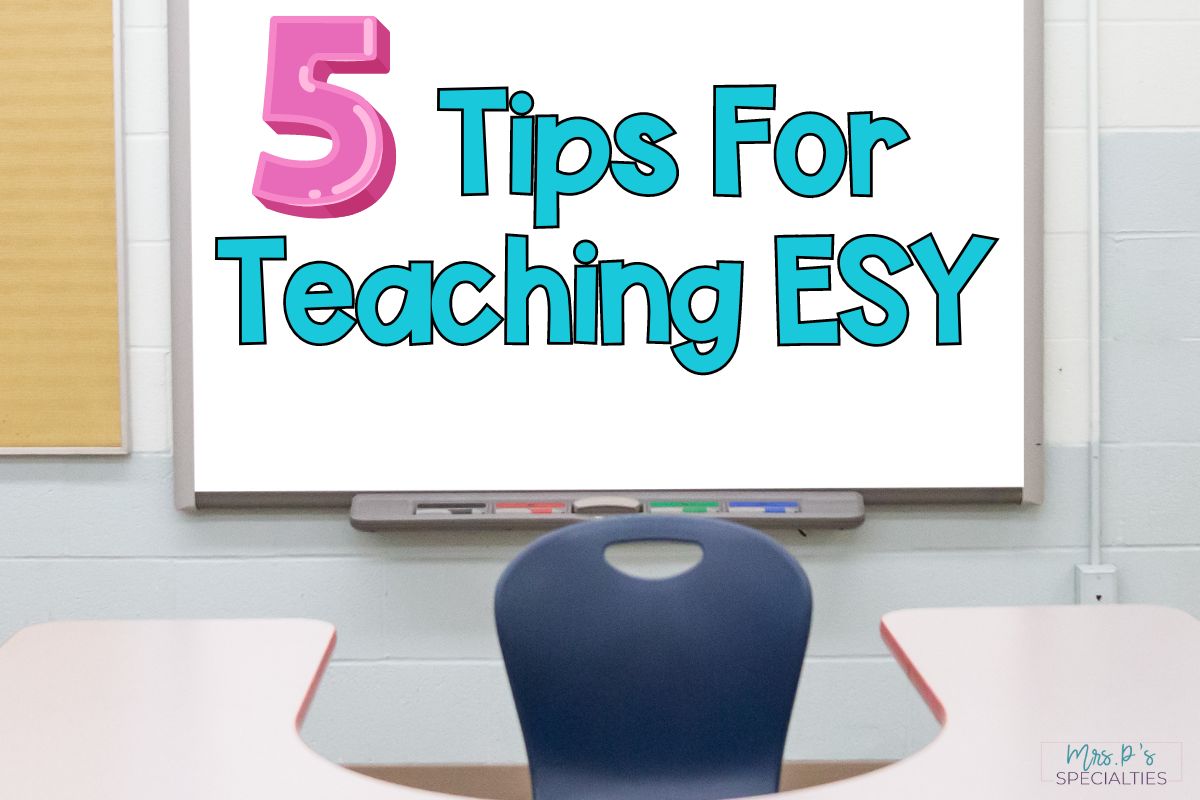Teaching ESY or summer programming in special education requires a balance of maintaining & generalizing skills while also building in more fun activities. Read on for 5 tips to help you create a program that will help students meet their ESY goals and set them up for success after summer.
The goal of esy programs
ESY or extended school year programs are meant to be a time when the focus moves from progression to maintaining skills. These programs are for students who have demonstrated that they lose skills during breaks in programming. It also takes them longer to recoup the skills.
Without ESY programs, these students would experience major regression making overall progress more and more challenging. With the goal of these programs differing from the regular school year, teaching ESY or summer school requires teachers to think a little differently.
don’t relax classroom structure
Yes, it is summer…. BUT students still need highly structured classrooms. Instead of changing up the structure, stick to routines while leaving room for summer-themed activities.
For example, during morning meeting add in a virtual field trip to add in some more fun. While it is fun, it’s also a great opportunity to build in language, and vocabulary and build up prior knowledge for the fall.
Target IEP skills in varied ways
Teaching ESY is a great opportunity for practicing IEP and functional skills in different ways. This varied practice is key to building functional skills that a student can use whenever and wherever needed.
Summer programming is an ideal time to add more activities that focus on life skills. Life skills activities naturally allow you to target multiple IEP goals at a time.
For example, you can target reading, math, writing, and vocational skills all at the same time in a cooking activity. When added to our schedule, it may look like this.
Monday: Look through recipes and choose what we want to make. Depending on the age of the students, you may want to also target searching online for recipes. Once a recipe has been chosen, make a grocery list. (Reading & Writing)
Tuesday: Take the grocery list to the grocery store and purchase the items. Involve students in making the purchase, choosing items within your budget, etc. (Math & Vocational)
Wednesday: Make the recipe allowing the students to measure ingredients and sequence the steps. After trying the recipe, have students talk about the steps, if they liked how it tasted, etc. Take photos of the class making the recipe. (Reading comprehension, Math, Life Skills)
Thursday: Write reviews on the recipe. Have students tell what they did and didn’t like about the recipe. (Writing)
Friday: Print out the photos and have students talk about what is going on in the photos to target vocabulary and verbs. Have students sequence the photos to retell what happened in the cooking group. Have students make a cooking scrapbook and write captions about the photos. (Communication/Language, Writing & Sequencing)
Weave social skills & IEP goals together
When teaching ESY, find games that encourage peer interactions and can target IEP goals. For example, this Life Skills BINGO game helps students target both social skills and functional skills.
With this game, you can target social skills such as:
- Taking turns
- Attending to peers
- Talking to peers
- Handling losing
You can also target labeling, matching, reading clues, talking about the vocabulary, etc.
keep students engaged with summer themes
An easy way to maintain structure, routines, and review is to just switch the materials you are using in the direct instruction, lesson plans, and task bins. Using theme unit when teaching summer school is one the easiest ways to improve engagement.
Here is the theme unit I recommend the most… the Ocean Theme Unit For Special Ed.
Just like the theme units for the rest of the school year, you can easily lesson plan for ESY with this summer-themed unit.
Field trips make teaching eSY better
If you can, choose weekly or biweekly trips out into the community when you are teaching ESY. Since our students often struggle with generalization, practicing skills in the community is ideal. If you aren’t able to take a field trip, consider virtual field trips!
While virtual trips don’t have the same benefits, they have some great ones. Here are a few:
- No permission slips and are usually free
- Students still have access to all of their behavior and communication supports since they’re in the classroom.
- You can pause to regroup and further breakdown concepts
Discovery Education has a whole list of virtual field trips for you. Click here to check out the list.

I hope these 5 tips are helpful and you have a fun and successful time teaching summer school!
(Visited 2 times, 2 visits today)




